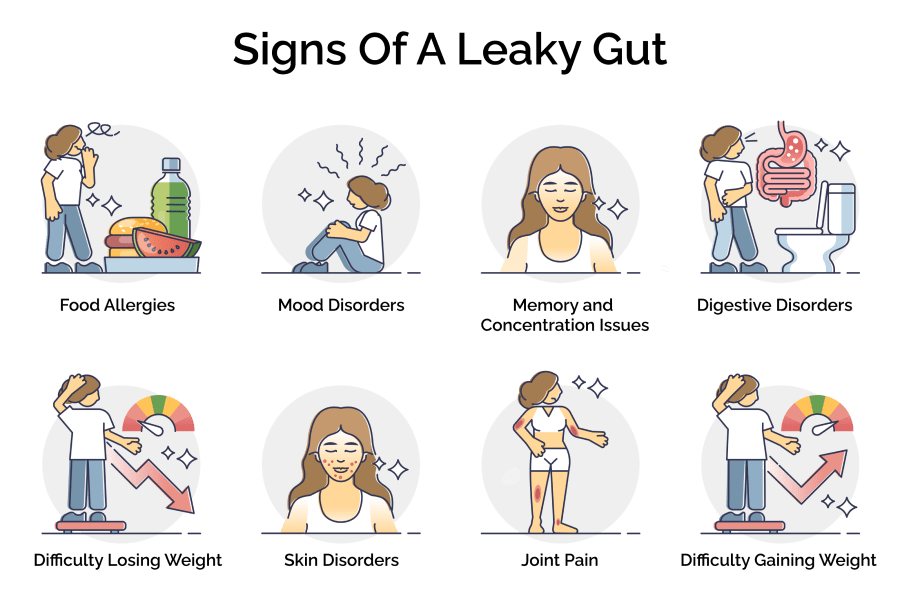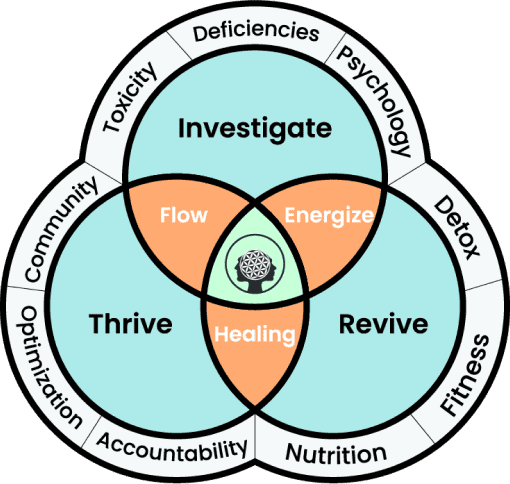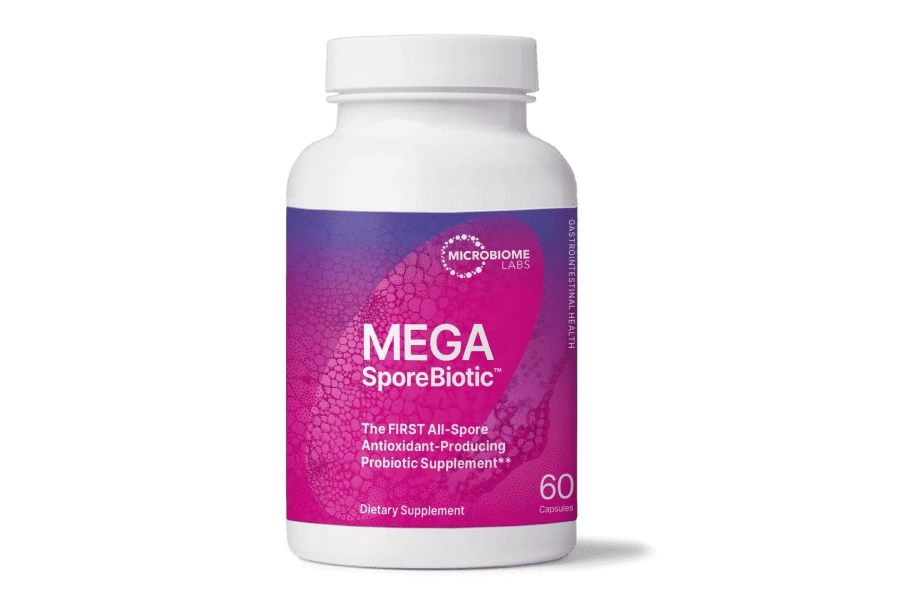Do you ever feel like you’re constantly dragging, bloated, or simply unwell? Have you experimented with countless diets or supplements but still haven’t found a remedy?
Well, the solution to your health woes might just lie within your gut. Recently, the notion of the “leaky gut” has come to the forefront of research, suggesting that disturbances in the gut can be a key factor in numerous health issues.
This article will delve into what a leaky gut entails, the factors that contribute to it, and, most importantly, how to elevate your gut health through simple dietary and lifestyle adjustments. You’re taking a pivotal step toward overall health and wellness by prioritizing your gut health. So let’s get started!
What is a Leaky Gut?
A leaky gut occurs when the lining of your gut becomes more permeable than it should be, which means that bacteria and toxins can leak through and enter your bloodstream. This can lead to all kinds of health problems, from inflammation to autoimmune disorders, and even chronic fatigue.
Imagine a bucket with holes in it – that’s what your gut can look like when it’s suffering from a leaky gut. All of the good stuff you put into your body, like vitamins, minerals, and nutrients, can slip right through those holes and never make it to where they need to go. Meanwhile, all the bad stuff, like toxins and bacteria, can leak out and wreak havoc on your system.

Factors Contributing to a Leaky Gut
1. Poor Diet
A diet that is high in processed and fried food and low in fiber from fruits and vegetables is considered a poor diet. This kind of diet can cause inflammation in your gut and release the zonulin protein, which can make the gut lining more permeable. Additionally, consuming the wrong food can make it harder for the body to break down and absorb them, leading to more inflammation which can contribute to the development of a leaky gut for creating an environment conducive to inflammation.
2. Stress
Stress is a state of mental or emotional strain caused by certain pressures and can lead to various health issues, including a leaky gut. When we experience stress, our body’s ability to fight off disease and infection is reduced. It can also decrease the function of our gut barrier and stomach acid levels, leading to malabsorption. Stress can also cause changes in the gut microbiota, which can increase intestinal permeability.
3. Alcohol
When you drink alcohol, it can disrupt the balance of bacteria in your gut and make it easier for harmful substances to cross from your gut into your body. This happens because alcohol triggers the production of a molecule called a tumor necrosis factor (TNF), which makes your gut barrier weaker. Fortunately, taking antibiotics by mouth can help reverse the changes alcohol makes to your gut bacteria and prevent this from happening.
4. Exposure to Toxins
There are a few things that can increase the risk of toxin exposure and contribute to a leaky gut. These include bacterial imbalance (known as dysbiosis), a poor diet (with things like sugar, GMOs, and dairy products), prolonged exposure to stress, and toxin overload from things like chemicals, antibiotics, pesticides, and contaminated tap water. All of these things can make your intestines weaker and more permeable, which may lead to inflammation and other issues.

What are the symptoms of a leaky gut?
1. Digestive Disorders
Digestive disorders and a leaky gut are closely linked. When the gut lining is compromised, it can allow harmful substances such as bacteria, toxins, and undigested food particles to leak into the bloodstream, causing inflammation and irritation in the gut.
Over time, this can lead to chronic digestive problems such as irritable bowel syndrome (IBS), chronic constipation, diarrhea, Crohn’s disease, and other inflammatory bowel diseases. These conditions can cause discomfort, pain, and even nutritional deficiencies that can impact your overall health and well-being.
2. Food Allergies
If you’re someone who suffers from food allergies, you may be interested to know that there’s a connection between your gut health and your allergies. When your gut lining becomes damaged, which can happen with a condition called “leaky gut,” large particles that are normally contained in the gut can leak into your bloodstream.
This can trigger an immune response, causing inflammation and the production of antibodies against these particles. Over time, this repeated exposure can lead to the development of food allergies and sensitivities. The chronic inflammation associated with a leaky gut can also further damage the gut lining, which can worsen the cycle of leaky gut and food allergies.
3. Fatigue
Increased intestinal permeability, or “leaky gut,” is associated with a range of symptoms that may cause fatigue. When the gut is compromised, it may not be able to absorb key nutrients efficiently, leading to nutritional deficiencies that can contribute to fatigue.
4. Mood Disorders
When your gut is compromised and leaky, it can trigger an immune response and lead to inflammation. This may produce chemical messengers that can directly affect the brain and the central nervous system, leading to mood changes and behavioral symptoms.
Additionally, a leaky gut can also contribute to nutrient deficiencies, which can negatively impact brain function and mood regulation. For example, low levels of B vitamins, magnesium, and omega-3 fatty acids have been linked to depression, anxiety, and other mood disorders.
5. Skin Problems
If you’re experiencing acne, rosacea, eczema, or other inflammatory skin conditions, it’s possible that they’re connected to your gut health. A leaky gut can cause an overactive immune system response, leading to inflammation and irritation of the skin. If you’re struggling with these skin issues, it may be worth looking into gut health solutions.
6. Inflammation
When our body experiences injury or infection, inflammation is the response. Chronic inflammation and leaky gut may be closely linked. A leaky gut can lead to an overactive immune response, causing chronic inflammation throughout the body. This, in turn, can further damage the gut lining, leading to a vicious cycle of inflammation and leaky gut.
7. Weight Loss or Gain
A leaky gut may potentially contribute to both weight gain and weight loss. A leaky gut inflammatory response may impair insulin sensitivity and disrupt metabolic processes, leading to weight gain and other metabolic disturbances.
Additionally, a leaky gut can also lead to nutrient malabsorption and deficiencies, which can negatively impact your metabolism and energy balance. This can lead to weight loss and other symptoms related to malnutrition.
8. Joint Pain
When the lining of your gut is damaged, which can occur due to factors like poor diet and stress it can allow harmful substances to enter your bloodstream. These substances can trigger an immune response in your body, leading to inflammation throughout your system. This inflammatory response can affect different parts of your body, including your joints, leading to discomfort and pain.
9. Memory and Concentration Issues
If toxins, undigested food particles, and bacteria enter your bloodstream due to a compromised intestinal wall, your immune system is triggered, leading to inflammation throughout your body, including your brain. This inflammation can result in various cognitive problems such as brain fog, difficulty concentrating, poor memory, and even depression and anxiety.

Effective Treatment Options for a Leaky Gut
1. Avoid Food Allergies
Avoiding food allergies can be a great way to treat a leaky gut by reducing inflammation and repairing the intestinal lining, and you can do this by trying an elimination diet that focuses on what you can eat, adding probiotic foods/supplements, and exercising regularly to restore gut health.
2. Eat a Healthy Diet
Eating a healthy diet is a great way to treat a leaky gut by providing beneficial gut bacteria that can balance harmful bacteria, reduce inflammation, and prevent chronic health issues like type 2 diabetes, heart disease, and cancer.
Adding fiber-rich foods can also nourish gut bacteria and promote their growth while avoiding certain foods like gluten, dairy, soy, corn, peanuts, sugar, and processed/refined foods can reduce damage to the digestive system.
3. Take Probiotics
Probiotics are tiny living organisms that can do a lot of good things for your gut. They can help you digest food better, reduce inflammation, boost your immune system, and even improve your mental health.
Studies suggest that taking probiotics regularly can lower your risk of chronic diseases like diabetes and heart disease. You want to be sure to pick the right probiotic that is suitable for your gut needs.
Microbiome Lab’s MegaSporeBiotic has been shown to maintain a healthy gut barrier function. It fosters a wider range of healthy bacteria while preserving important commensal or natural gut bacteria.
4. Drink Enough Water
When your body is dehydrated, it can disrupt the protective lining of your gut, making it more vulnerable to bacteria and toxins. This can lead to inflammation and immune response.
But staying hydrated helps to keep the gut lining healthy and moist, which reduces the risk of a leaky gut. Drinking more water is beneficial for your gut because it helps to flush out toxins, maintains a healthy gut balance, heals the gut barrier, and improves digestion and nutrient absorption.
5. Exercise Regularly
Exercise offers benefits beyond just improving our physical health. It can also enhance digestion, alleviate inflammation, and alleviate stress, which are all factors that can worsen the symptoms of a leaky gut. By exercising and strengthening the muscles in your intestines, your body can better digest and absorb food, supporting overall gut health.
6. Meditation
Meditation can also help with a leaky gut. Meditation can reduce our stress levels, which can lower inflammation and boost our immune system. Plus, meditation can lower our cortisol levels, which can help keep our gut lining strong and reduce the risk of a leaky gut.
By reducing stress, meditation can even help improve digestion and promote the production of gastric juices and stomach acid, which can help our gut lining heal even faster.
7. Get Enough Sleep
Getting much-needed sleep is also important in treating a leaky gut. When the walls of our intestines become permeable, it can lead to all sorts of health problems, including depression, allergies, and autoimmune disorders. And not getting enough sleep can actually make things worse.
When we don’t get enough rest, our immune system weakens, making it more likely for bacteria and toxins to sneak into our bloodstream. Find easy and practical ways to improve your sleep.

Leaky Gut FAQ
What are the long-term effects of a leaky gut?
Improving your gut health is crucial as a leaky gut can result in a variety of health problems, such as digestive issues, skin disorders, chronic fatigue, weakened immunity, and even more severe conditions like diabetes and inflammatory bowel disease.
To support your gut health, there are steps you can take, such as modifying your diet and taking supplements. Additionally, don’t hesitate to seek the guidance of a medical professional or an integrative nutrition team if you require further assistance.
What foods should be avoided with a leaky gut?
For those who are dealing with a leaky gut, it’s crucial to be mindful of what you consume. It’s advisable to steer clear of highly processed foods, junk food, additives, fillers, sodium, and sugar.
Moreover, you may consider reducing your intake of inflammatory ingredients such as gluten, dairy, corn, soy, eggs, sugar, alcohol, and processed foods. Instead, prioritize consuming whole, nutrient-dense foods like fruits, vegetables, high-quality protein, nuts, and seeds. Additionally, include healthy fats and fermented foods in your diet to support your gut health.












Leave a Reply
You must be logged in to post a comment.